Key Takeaways
- Understand the legal requirements: Familiarize yourself with Hong Kong’s employment laws, contracts, and compliance obligations to ensure a fair and transparent working relationship.
- Foster a diverse workforce: Embrace diversity and promote a culture of inclusivity to tap into unique perspectives and strengths, enhancing your organization’s innovation and success.
- Invest in employee development and engagement: Create opportunities for professional growth, provide competitive compensation packages, and cultivate a culture of continuous learning to attract and retain top talent in Hong Kong’s competitive job market.
Welcome to our comprehensive guide on how to hire employees in Hong Kong.
Whether you’re an established business expanding into the vibrant Hong Kong market or a budding entrepreneur looking to establish your presence in this global financial hub, understanding the intricacies of the local employment landscape is essential for success.
With its robust economy, favorable business environment, and strategic location bridging East and West, Hong Kong offers immense opportunities for companies looking to tap into the Asian market.
In this extensive guide, we will walk you through the entire process of hiring employees in Hong Kong, from understanding the legal requirements and obligations to finding and attracting top talent.
We will cover the key aspects that employers need to consider, ensuring that you are well-equipped with the knowledge and insights necessary to make informed decisions throughout the hiring process.
Hong Kong’s employment landscape is governed by a unique set of laws and regulations, which are designed to maintain a fair and transparent working environment for both employers and employees.
Understanding and complying with these regulations is crucial to avoid legal pitfalls and maintain a positive employer-employee relationship.
We will delve into the Hong Kong Employment Ordinance, exploring the rights and obligations of employers and employees, including working hours, leave entitlements, termination procedures, and much more.
Navigating the process of hiring employees can be a daunting task, especially in a foreign market.
That’s why we will guide you through the intricacies of the recruitment process in Hong Kong, providing you with expert tips and strategies for sourcing, evaluating, and selecting the right candidates for your organization.
From crafting compelling job descriptions and leveraging online platforms to conducting effective interviews and performing background checks, we will equip you with the tools necessary to build a talented and dedicated team.
Compensation and benefits play a crucial role in attracting and retaining top talent.
In Hong Kong’s competitive job market, offering an attractive and competitive package is essential for attracting skilled professionals.
We will explore the various factors to consider when structuring compensation packages, including salary benchmarks, bonuses, allowances, and employee benefits.
Additionally, we will discuss the mandatory provident fund (MPF) scheme, a key component of Hong Kong’s retirement protection system, and provide guidance on complying with its requirements.
Hong Kong is known for its multicultural workforce, with professionals from different parts of the world converging in this cosmopolitan city.
We will delve into the intricacies of managing a diverse workforce, discussing best practices for fostering inclusivity, promoting cross-cultural understanding, and ensuring equal opportunities for all employees.
By embracing diversity, you can unlock innovation, creativity, and productivity within your organization.
Furthermore, we will explore the different types of employment contracts in Hong Kong, such as full-time, part-time, and fixed-term contracts, and provide insights into their advantages and considerations.
We will also touch upon the hiring of non-local employees, explaining the requirements for obtaining employment visas and work permits, as well as the various schemes available for hiring overseas talent.
Finally, we will discuss the importance of ongoing employee development and engagement in Hong Kong’s competitive business environment.
Investing in your employees’ growth and well-being is crucial for enhancing productivity and nurturing a positive work culture.
We will share strategies for implementing training programs, performance management systems, and employee engagement initiatives that foster loyalty, motivation, and continuous improvement.
As you embark on the journey of hiring employees in Hong Kong, this comprehensive guide will serve as your trusted companion, offering insights, tips, and practical advice every step of the way.
By understanding the unique dynamics of the local employment landscape, you will be well-prepared to navigate the challenges and seize the abundant opportunities that Hong Kong has to offer.
So let’s dive in and unlock the secrets to successful employee recruitment and management in this dynamic and vibrant city.
Before we venture further into this article, we like to share who we are and what we do.
About 9cv9
9cv9 is a business tech startup based in Singapore and Hong Kong, with a strong presence all over the world.
With over six years of startup and business experience, and being highly involved in connecting with thousands of companies and startups, the 9cv9 team has listed some important learning points in this overview of the guide to hiring the best employees and talents in Hong Kong SAR.
If your company needs recruitment and headhunting services to hire top-quality employees, you can use 9cv9 headhunting and recruitment services to hire top talents and candidates. Find out more here, or send over an email to [email protected].
Or just post 1 free job posting here at 9cv9 Hiring Portal in under 10 minutes.
How to Hire Employees in Hong Kong: The Complete Guide
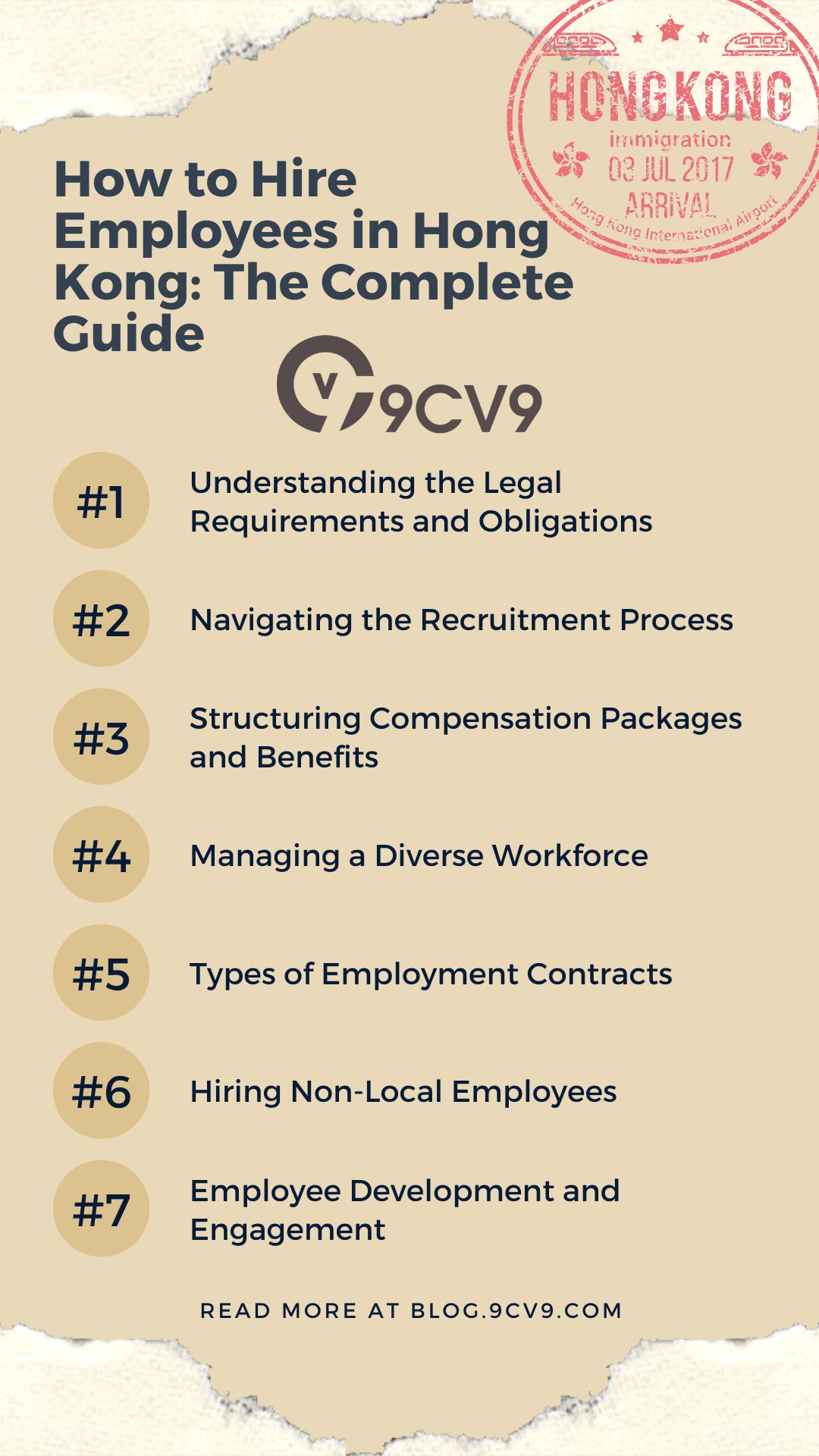
- Understanding the Legal Requirements and Obligations
- Navigating the Recruitment Process
- Structuring Compensation Packages and Benefits
- Managing a Diverse Workforce
- Types of Employment Contracts
- Hiring Non-Local Employees
- Employee Development and Engagement
1. Understanding the Legal Requirements and Obligations to Hire Employees in Hong Kong
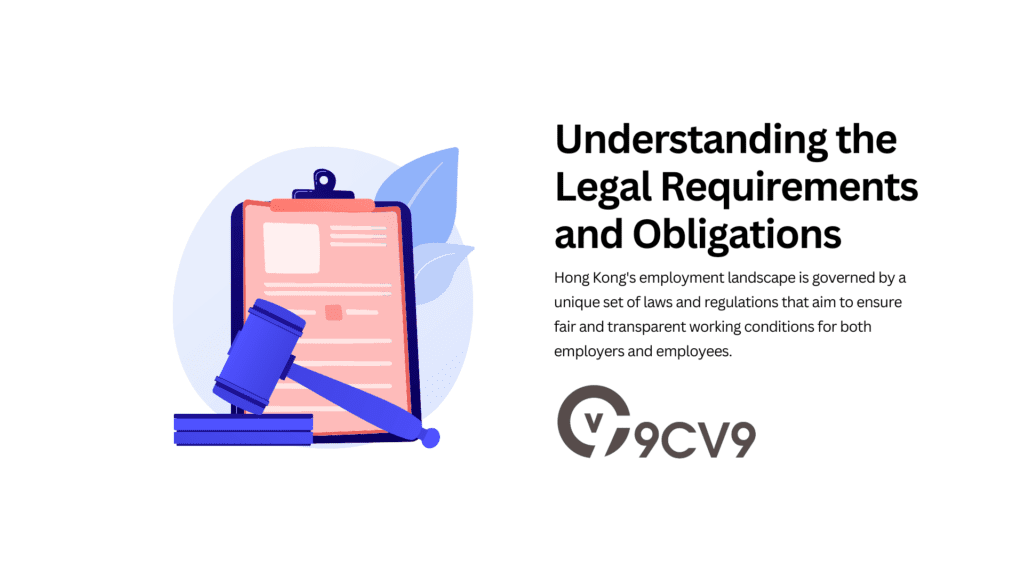
When it comes to hiring employees in Hong Kong, having a solid understanding of the legal requirements and obligations is essential.
Hong Kong’s employment landscape is governed by a unique set of laws and regulations that aim to ensure fair and transparent working conditions for both employers and employees.
By familiarizing yourself with these regulations, you can navigate the hiring process smoothly while staying compliant and avoiding potential legal pitfalls.
At the heart of Hong Kong’s employment laws is the Hong Kong Employment Ordinance.
This comprehensive legislation sets out the rights and obligations of employers and employees, covering a wide range of aspects such as working hours, leave entitlements, and termination procedures.
One crucial aspect to consider is working hours.
According to the Employment Ordinance, the standard working hours in Hong Kong are 44 hours per week, with a maximum of 8 hours per day.
It’s important to ensure that your employees’ working hours comply with these regulations to prevent any violation of the law.
Another key area covered by the Employment Ordinance is leave entitlements.
In Hong Kong, employees are entitled to various types of leave, including annual leave, sick leave, and statutory holidays.
For example, employees who have completed at least 12 months of continuous employment are entitled to seven days of annual leave.
Understanding these entitlements is vital to ensure that your employees receive the benefits they are legally entitled to.
Termination procedures are also governed by the Employment Ordinance.
If you need to terminate an employee’s contract, you must follow the prescribed procedures and provide the appropriate notice period or payment in lieu of notice.
Failure to comply with these procedures can lead to legal consequences and potential disputes.
Additionally, it’s crucial to be aware of other legal obligations, such as providing a safe and healthy working environment for your employees.
This includes taking necessary measures to prevent accidents and occupational diseases and complying with relevant health and safety regulations.
To stay compliant with the legal requirements, it’s advisable to seek professional legal advice or consult the Hong Kong Labour Department, which provides guidance and resources on employment-related matters.
By understanding and adhering to the legal requirements and obligations in Hong Kong, you can foster a fair and harmonious working environment while mitigating potential risks.
It’s essential to keep abreast of any updates or changes to the employment laws to ensure ongoing compliance with the latest regulations.
In the next section, we will delve deeper into the recruitment process, providing insights and strategies for sourcing, evaluating, and selecting the right candidates for your organization.
Stay tuned for expert tips on attracting top talent in Hong Kong’s competitive job market.
2. Navigating the Recruitment Process to Hire Employees in Hong Kong
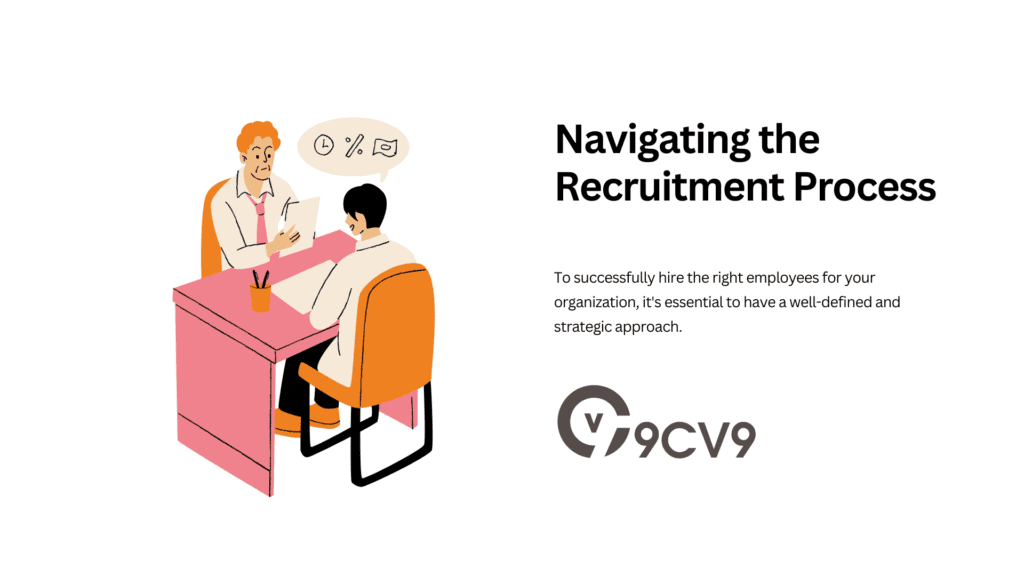
The recruitment process can be a complex and challenging task, especially in a competitive job market like Hong Kong.
To successfully hire the right employees for your organization, it’s essential to have a well-defined and strategic approach.
In this section, we will guide you through the intricacies of the recruitment process, providing you with valuable insights and expert tips to help you source, evaluate, and select top talent in Hong Kong.
- Crafting Compelling Job Descriptions: The first step in the recruitment process is to create job descriptions that accurately reflect the requirements and responsibilities of the position. A well-crafted job description will attract qualified candidates and help you filter out those who are not the right fit. Be clear and concise in outlining the essential qualifications, skills, and experience required for the role. Also, read this article and guide to learn how to create the best job descriptions.
- Sourcing and Attracting Top Talent: Once you have a solid job description in place, it’s time to identify potential candidates. There are various avenues to source talent in Hong Kong, including online job portals, professional networks, and recruitment agencies. Leverage these platforms to reach a wide pool of candidates and increase your chances of finding the right match for your organization.
- Leveraging Online Platforms and Recruitment Agencies: Online platforms such as 9cv9 Hong Kong, LinkedIn, JobsDB, and Indeed are popular resources for both job seekers and employers in Hong Kong. Create compelling job postings on these platforms, highlighting the unique aspects of your organization and the opportunities you offer. Additionally, consider partnering with reputable recruitment agencies that specialize in your industry or specific job roles. These agencies can provide valuable insights, access to a wider network of candidates, and assistance in the screening and selection process.
- Conducting Effective Interviews and Assessments: Interviews play a critical role in assessing candidates’ suitability for the job. Prepare a structured interview process that includes behavioral and situational questions to evaluate candidates’ skills, experience, and cultural fit. Consider conducting multiple rounds of interviews to gain a comprehensive understanding of each candidate. Additionally, incorporate assessments, such as technical tests, presentations, or case studies, to assess specific skills relevant to the role.
- Performing Background Checks and Reference Verification: Before making a final decision, it’s crucial to conduct thorough background checks and verify references. This step helps validate the information provided by candidates and ensures their suitability and credibility. Check educational qualifications, previous employment history, and professional certifications. Reach out to references provided by candidates to gather insights into their past performance and work ethic.
- Employer Branding and Candidate Experience: Building a strong employer brand is vital in attracting and retaining top talent. Showcase your organization’s values, culture, and opportunities for growth. Communicate your unique selling points and highlight employee testimonials or success stories. Additionally, prioritize the candidate experience throughout the recruitment process. Provide timely and transparent communication, offer a smooth and efficient application process, and create a positive impression of your organization.
- Diversity and Inclusion: Embracing diversity and inclusion in your recruitment process can lead to greater innovation, creativity, and employee satisfaction. Ensure that your hiring practices promote equal opportunities and eliminate biases. Implement blind screening techniques, use diverse interview panels, and create an inclusive and welcoming environment for candidates from all backgrounds.
By following these strategies and best practices, you can navigate the recruitment process in Hong Kong more effectively, attracting and selecting the best candidates for your organization.
Remember to continuously evaluate and refine your recruitment strategies to adapt to the evolving job market and changing candidate expectations.
Or, to save time and money, you can use 9cv9 headhunting and recruitment services to hire top talents and candidates. Find out more here, or send over an email to [email protected].
In the next section, we will delve into the crucial aspect of structuring compensation packages and benefits, ensuring that your offerings are competitive in Hong Kong’s job market.
Stay tuned for insights into salary benchmarks, bonuses, and employee benefits.
3. Structuring Compensation Packages and Benefits to Hire Employees in Hong Kong
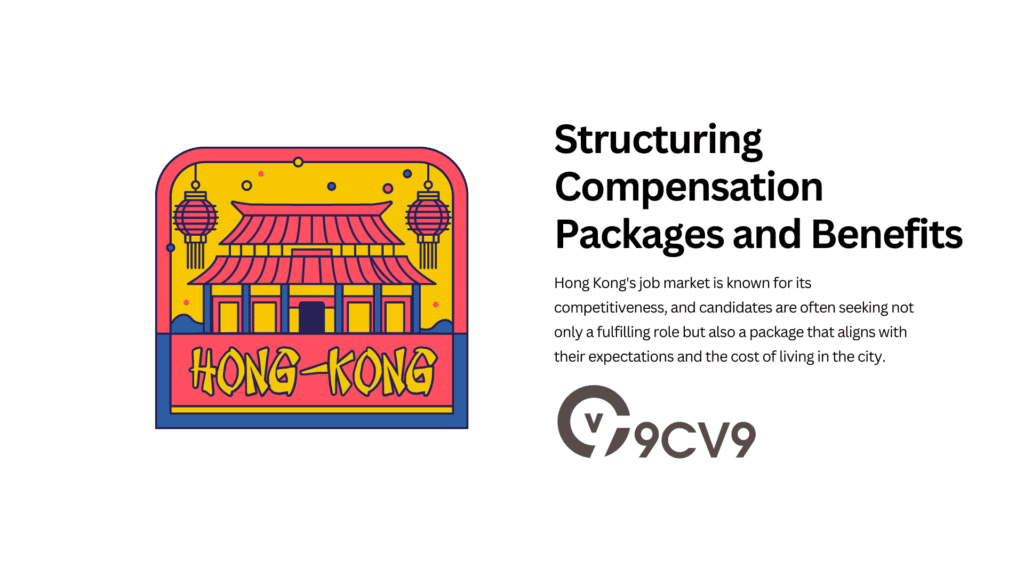
When it comes to hiring employees in Hong Kong, offering a competitive compensation package is crucial for attracting and retaining top talent.
Hong Kong’s job market is known for its competitiveness, and candidates are often seeking not only a fulfilling role but also a package that aligns with their expectations and the cost of living in the city.
In this section, we will explore the key considerations and strategies for structuring compensation packages and benefits in Hong Kong.
- Importance of Competitive Compensation: In Hong Kong’s job market, where talent is in high demand, offering competitive compensation is essential to attract skilled professionals. Candidates often compare salary packages across different organizations, so it’s crucial to ensure that your offerings are in line with industry standards and benchmarks.
- Salary Benchmarks and Industry Standards: Conduct thorough research to determine the salary benchmarks for the role you are hiring for. Various resources, such as salary surveys, industry reports, and recruitment agencies, can provide valuable insights into the average salaries and compensation trends in your industry. Use this information as a guide to determine a competitive salary range for the position.
- Bonuses, Allowances, and Incentives: In addition to base salaries, consider offering performance-based bonuses, allowances, and incentives. Performance bonuses can motivate employees to achieve their targets and contribute to the overall success of the organization. Allowances, such as housing or transportation allowances, can help employees manage the high cost of living in Hong Kong. Incentive programs, such as profit-sharing or stock options, can align employees’ interests with the long-term growth and success of the company.
- Employee Benefits: In Hong Kong, employee benefits play a significant role in attracting and retaining talent. Consider providing a comprehensive benefits package that includes healthcare coverage, retirement plans, and insurance options. The Mandatory Provident Fund (MPF) scheme is a crucial component of Hong Kong’s retirement protection system, and employers are required to make contributions to their employees’ MPF accounts. Familiarize yourself with the MPF requirements and ensure compliance.
- Flexible Work Arrangements: In recent years, flexible work arrangements have become increasingly important for employees. Consider offering flexible working hours, remote work options, or compressed workweeks, where feasible. This flexibility can enhance work-life balance and attract candidates who value flexibility and autonomy.
- Total Rewards Approach: Adopt a total rewards approach to compensation, which considers not only financial rewards but also non-monetary aspects of the employment experience. Highlight opportunities for career growth and development, work-life balance initiatives, employee recognition programs, and a positive work culture. Communicate the overall value proposition of working for your organization beyond just the salary.
- Compliance with Employment Laws: Ensure that your compensation packages and benefits comply with the relevant employment laws and regulations in Hong Kong. Stay updated on any changes to the legislation to avoid legal issues or disputes. Seek legal advice or consult the Hong Kong Labour Department to ensure compliance with the latest requirements.
By structuring competitive compensation packages and benefits, you can position your organization as an attractive employer in Hong Kong’s competitive job market.
Regularly review and benchmark your offerings to ensure they remain aligned with industry standards and the evolving needs of your employees.
In the next section, we will explore the importance of managing a diverse workforce in Hong Kong and strategies for fostering inclusivity and equal opportunities.
Stay tuned for valuable insights on embracing diversity for organizational success.
4. Managing a Diverse Workforce to Hire Employees in Hong Kong
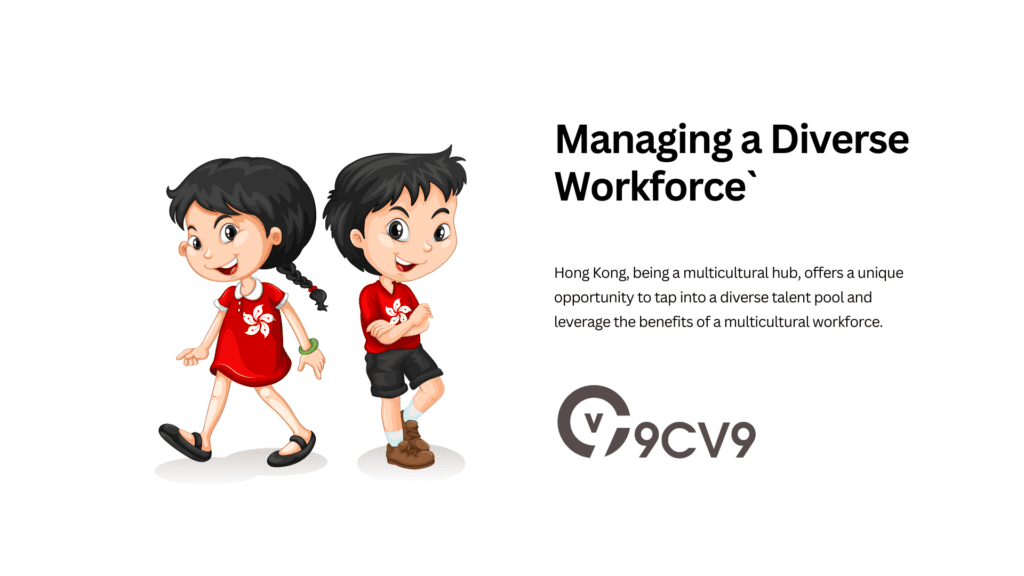
In today’s globalized world, managing a diverse workforce is not only a matter of inclusion and equality but also a strategic advantage for organizations.
Hong Kong, being a multicultural hub, offers a unique opportunity to tap into a diverse talent pool and leverage the benefits of a multicultural workforce.
In this section, we will explore the importance of managing a diverse workforce in Hong Kong and provide strategies for fostering inclusivity, cross-cultural understanding, and equal opportunities within your organization.
- Embracing Hong Kong’s Multicultural Workforce: Hong Kong boasts a rich cultural tapestry, with individuals from various ethnicities, nationalities, and backgrounds. Embracing this diversity brings a wealth of perspectives, experiences, and ideas to your organization. Recognize the value that a diverse workforce can bring in terms of innovation, creativity, and problem-solving.
- Fostering Inclusivity and Cross-Cultural Understanding: Create an inclusive work environment where every employee feels valued, respected, and empowered. Develop policies and practices that promote equal opportunities, non-discrimination, and fairness. Offer diversity and inclusion training programs to enhance cross-cultural understanding and sensitivity among employees. Encourage open dialogue and collaboration across different cultures and backgrounds.
- Ensuring Equal Opportunities: Ensure that all employees have equal access to growth opportunities, career advancement, and development programs. Implement transparent performance evaluation processes that are free from biases and promote meritocracy. Provide mentorship and coaching programs to support the career progression of employees from diverse backgrounds. Create a culture that rewards and recognizes talent and contributions, regardless of cultural or ethnic background.
- Benefits of Diversity for Innovation and Productivity: Numerous studies have shown that diverse teams foster innovation, creativity, and better decision-making. By bringing together individuals with different perspectives and experiences, you can tap into a broader range of ideas and solutions. Encourage collaboration and teamwork among employees from diverse backgrounds, and leverage their unique strengths to drive innovation and productivity within your organization.
- Managing Communication and Language Diversity: In a multicultural workforce, language diversity may be a challenge. Ensure effective communication channels that accommodate employees who may speak different languages. Provide language support or training programs to enhance language proficiency and facilitate communication. Foster an environment where employees feel comfortable seeking clarification and expressing themselves in their preferred language.
- Employee Resource Groups: Employee resource groups (ERGs) or affinity groups can be a valuable resource for supporting diversity and fostering a sense of belonging. These groups bring together employees who share common characteristics or experiences, providing a platform for networking, mentorship, and advocacy. Encourage the formation of ERGs within your organization and support their initiatives.
- Promoting Work-Life Balance and Well-being: Recognize that employees from diverse backgrounds may have different cultural expectations and priorities. Promote work-life balance initiatives that cater to the diverse needs of your workforce. Offer flexible work arrangements, wellness programs, and initiatives that promote physical and mental well-being. A healthy and supportive work environment contributes to employee satisfaction and retention.
By actively managing a diverse workforce, you can unlock the full potential of your employees and create a more inclusive and innovative organizational culture.
Celebrate the richness of cultural diversity within your organization and strive for equal opportunities and representation at all levels.
In the next section, we will delve into the different types of employment contracts in Hong Kong, outlining their advantages and considerations.
Stay tuned for insights into structuring effective employment contracts for your employees in Hong Kong.
5. Types of Employment Contracts to Hire Employees in Hong Kong
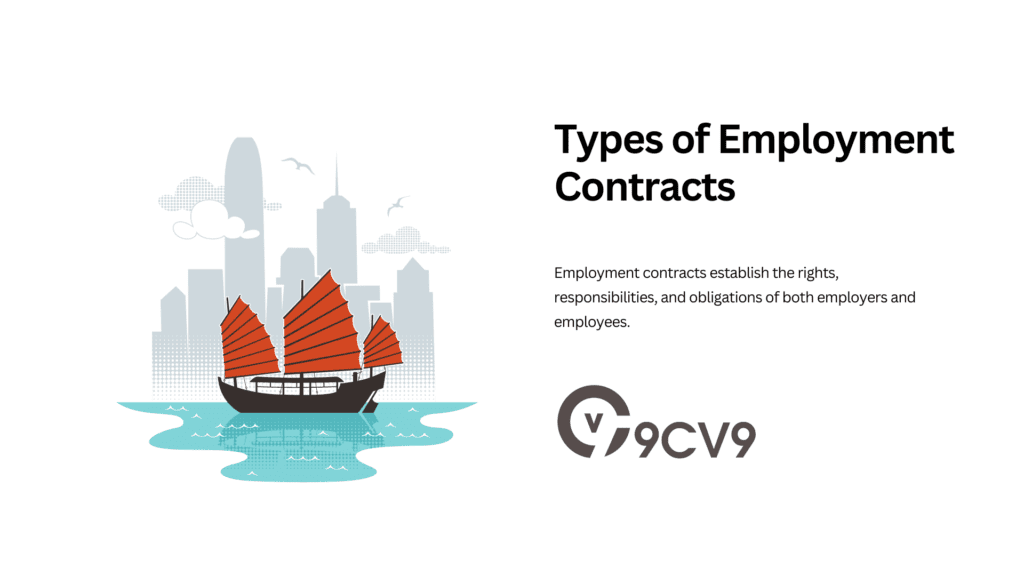
When hiring employees in Hong Kong, it’s crucial to understand the different types of employment contracts available and their implications.
Employment contracts establish the rights, responsibilities, and obligations of both employers and employees.
In this section, we will explore the various types of employment contracts commonly used in Hong Kong and provide insights into their advantages and considerations.
- Permanent Employment Contracts: Permanent employment contracts are the most common type of employment arrangement in Hong Kong. They establish a long-term employment relationship between the employer and the employee, without a fixed end date. Permanent contracts provide stability and job security for employees and offer employers the opportunity to cultivate long-term relationships with their workforce. However, employers should carefully consider the terms and conditions outlined in the contract, including notice periods and termination procedures.
- Fixed-Term Employment Contracts: Fixed-term employment contracts are used for temporary or project-based roles with a specific duration. These contracts specify the start and end dates of employment. Fixed-term contracts provide flexibility for employers to hire employees for short-term needs or to meet seasonal demands. However, it’s important to comply with the legal requirements regarding fixed-term contracts, including providing the appropriate notice period and clearly defining the terms of employment.
- Part-Time Employment Contracts: Part-time employment contracts are suitable for employees who work fewer hours than full-time employees. These contracts outline the agreed-upon working hours, remuneration, and benefits for part-time employees. Part-time contracts offer flexibility for both employers and employees, allowing individuals to balance work with other commitments. However, employers must ensure compliance with labor laws regarding working hours, overtime, and entitlements for part-time employees.
- Temporary Employment Contracts: Temporary employment contracts are used for short-term or casual engagements. These contracts are typically for a specific task, project, or event. Temporary contracts offer flexibility for employers to meet immediate staffing needs or cover employee absences. Employers should clearly define the duration, scope of work, and conditions of employment in temporary contracts. It’s important to note that temporary employees may still be entitled to certain benefits and protections under employment laws.
- Probationary Employment Contracts: Probationary employment contracts are used to assess an employee’s suitability for a position during a specified probationary period. These contracts allow employers to evaluate the performance, skills, and fit of new employees before confirming their permanent employment. Probationary contracts typically have a shorter notice period for termination. However, employers should adhere to the legal requirements regarding probationary periods and provide appropriate guidance and support to probationary employees.
- Outsourced Employment Contracts: Outsourced employment contracts involve engaging third-party service providers or agencies to supply employees for specific functions or roles. This arrangement allows organizations to access specialized skills or resources without directly employing individuals. When entering into outsourced contracts, it’s crucial to establish clear terms and responsibilities, ensuring compliance with relevant employment laws and protecting the rights and interests of the outsourced employees.
- Freelance or Independent Contractor Agreements: Freelance or independent contractor agreements are suitable for individuals who provide services on a project-by-project basis. These agreements establish a business relationship between the contractor and the hiring organization, rather than an employment relationship. Freelancers or independent contractors are responsible for their own taxes, insurance, and other legal obligations. It’s essential to clearly define the scope of work, deliverables, and payment terms in these agreements.
When choosing the appropriate type of employment contract for your organization, consider factors such as the nature of the work, duration of engagement, flexibility required, and legal obligations.
It’s advisable to seek legal advice or consult the Hong Kong Labour Department to ensure compliance with employment laws and regulations.
6. Hiring Non-Local Employees
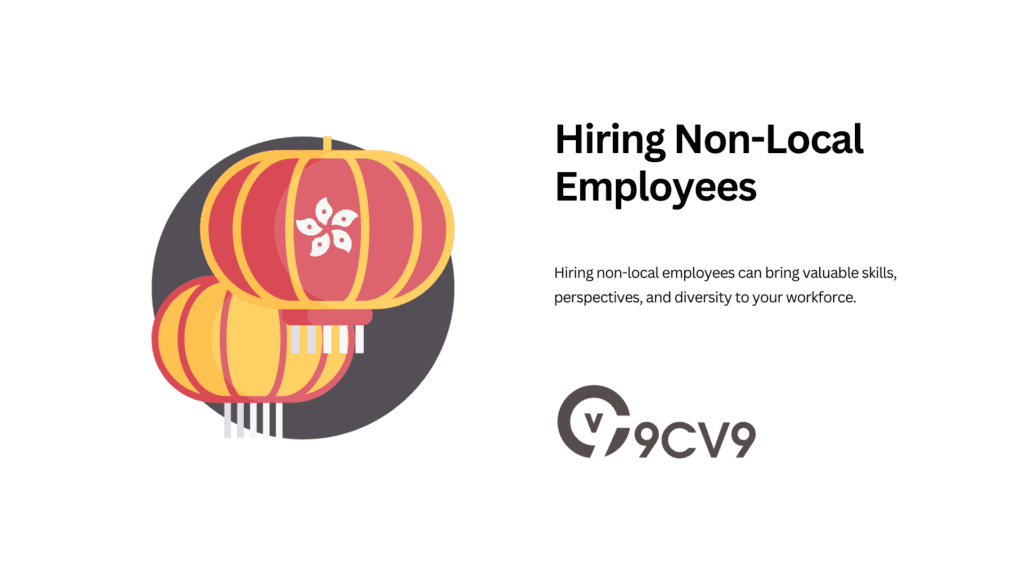
Hong Kong’s thriving business landscape attracts talent from around the world, making it common for organizations to hire non-local employees.
Hiring non-local employees can bring valuable skills, perspectives, and diversity to your workforce.
However, it’s essential to understand the legal requirements, procedures, and considerations involved in hiring non-local employees in Hong Kong.
In this section, we will explore the key steps and insights for successfully hiring non-local employees in Hong Kong.
- Obtaining a Work Visa: Non-local employees who wish to work in Hong Kong generally require a work visa or employment visa. The employer plays a crucial role in sponsoring and supporting the visa application process. It’s important to familiarize yourself with the various work visa categories and requirements set by the Hong Kong Immigration Department. Common work visa categories include the General Employment Policy (GEP) for professionals, the Admission Scheme for Mainland Talents and Professionals (ASMTP), and the Employment for Professionals (EFP) scheme.
- Job Market Test: Before hiring a non-local employee, employers in Hong Kong are generally required to conduct a job market test. This test ensures that suitable local candidates have been given an opportunity to fill the position before considering non-local applicants. Employers must advertise the job vacancy on the Hong Kong government’s designated platforms and demonstrate efforts to recruit local talent. The job market test aims to prioritize local employment opportunities while still allowing organizations to hire non-local employees when necessary.
- Application Process and Documentation: Once a non-local employee has been selected for a position, the employer must initiate the work visa application process. The employee is typically responsible for gathering and providing the necessary documentation, such as a valid passport, educational qualifications, and relevant work experience. The employer plays a crucial role in providing supporting documents, including a job offer letter, employment contract, and evidence of financial viability to support the employee’s stay in Hong Kong.
- Sponsorship and Assistance: As the employer, you will act as the sponsor for the non-local employee’s work visa application. It’s essential to provide clear guidance and assistance throughout the application process. Engage with the employee and provide them with the necessary information and documents required for the visa application. Maintain open communication and address any concerns or questions they may have regarding their employment and visa status.
- Immigration Consultation and Compliance: Navigating the immigration process can be complex, especially when hiring non-local employees. Consider engaging an immigration consultant or seeking legal advice to ensure compliance with immigration laws, regulations, and procedures. An experienced professional can guide you through the intricacies of the application process, increase the chances of a successful outcome, and help you avoid any legal pitfalls.
- Cultural Integration and Support: Hiring non-local employees involves more than just obtaining work visas. It’s important to facilitate the cultural integration and support of these employees within your organization. Consider implementing orientation programs, cultural awareness training, and mentorship initiatives to help non-local employees adapt to the work environment, understand local customs, and feel welcomed and supported.
- Compliance with Employment Laws: When hiring non-local employees, it’s crucial to comply with the relevant employment laws and regulations in Hong Kong. Ensure that you adhere to minimum wage requirements, working hour limits, and employee entitlements, such as holidays, sick leave, and rest days. Stay updated on any changes to labor laws and seek legal advice or consult the Hong Kong Labor Department to ensure compliance.
- Housing and Relocation Support: Non-local employees may require assistance with housing and relocation. Provide guidance and support in finding suitable accommodation, navigating the local rental market, and understanding lease agreements. Offer resources or connect employees with relocation services to facilitate a smooth transition to their new living arrangements in Hong Kong.
- Language and Cultural Support: Language and cultural differences can present challenges for non-local employees. Offer language support services or language training programs to help them overcome language barriers and communicate effectively in the workplace. Foster a culture of inclusivity and respect for different cultures, encouraging collaboration and understanding among employees from diverse backgrounds.
- Ongoing Support and Engagement: Once non-local employees are onboarded, it’s crucial to provide ongoing support and engagement. Regularly check in with them, address any concerns they may have, and provide opportunities for professional development and career growth. Consider implementing employee engagement initiatives, such as team-building activities, networking events, and mentorship programs, to foster a sense of belonging and build strong relationships within your organization.
Hiring non-local employees can bring a wealth of benefits to your organization, including diverse perspectives, global expertise, and enhanced cultural understanding.
By understanding and navigating the legal requirements, providing comprehensive support, and fostering a welcoming and inclusive work environment, you can successfully hire and integrate non-local employees into your workforce.
7. Employee Development and Engagement: Fostering Growth and Retention

In today’s competitive business landscape, investing in employee development and engagement is crucial for organizations in Hong Kong to attract and retain top talent.
Employee development programs not only enhance individual skills and knowledge but also contribute to overall organizational growth and success.
In this section, we will explore the importance of employee development and engagement, and provide valuable insights into designing effective programs to foster growth, engagement, and retention.
- Importance of Employee Development: Employee development goes beyond just training and acquiring new skills. It is a strategic approach to nurture talent, promote continuous learning, and unlock the full potential of employees. Investing in employee development demonstrates your organization’s commitment to employee growth, which leads to increased job satisfaction, improved performance, and higher employee retention rates. It also enables organizations to adapt to changing business environments and stay competitive in the market.
- Assessing Training Needs: Before designing employee development programs, it’s essential to assess the training needs of your workforce. Conduct thorough training needs assessments, which may include surveys, performance evaluations, and discussions with employees and managers. Identify skill gaps, individual aspirations, and organizational needs to tailor development initiatives that align with both employee and organizational goals.
- Professional Skills Development: Offering opportunities for professional skills development is a powerful way to enhance employee capabilities. Provide training programs, workshops, or certifications that focus on improving technical skills, industry-specific knowledge, and job-related competencies. Stay updated with the latest trends, technologies, and best practices in your industry to ensure your employees receive relevant and valuable training.
- Leadership and Management Development: Developing strong leaders and effective managers is vital for the long-term success of any organization. Implement leadership and management development programs that cultivate leadership skills, emotional intelligence, decision-making abilities, and effective communication. Offer coaching, mentoring, or leadership workshops to groom high-potential employees for future leadership positions within the organization.
- Soft Skills Enhancement: Soft skills, such as communication, teamwork, problem-solving, and adaptability, are essential for employee success in today’s dynamic work environment. Provide opportunities for employees to develop their soft skills through workshops, interactive training sessions, or team-building activities. Soft skills training fosters better collaboration, conflict resolution, and relationship-building within teams and across the organization.
- Career Development and Advancement: Employees are more likely to stay engaged and committed when they see a clear path for career development and advancement. Establish a framework for career progression, including opportunities for promotion, lateral moves, or cross-functional assignments. Offer regular performance evaluations, career coaching, and development plans to support employees in reaching their career goals and aspirations.
- Mentoring and Coaching Programs: Implement mentoring and coaching programs to facilitate knowledge transfer, skill development, and career guidance. Pair experienced employees with junior staff to foster learning, professional growth, and personal development. Mentoring relationships provide a supportive environment for employees to seek guidance, gain insights, and build meaningful connections within the organization.
- Employee Engagement Initiatives: Employee development and engagement go hand in hand. Engaged employees are more likely to invest in their own development and contribute positively to the organization. Implement employee engagement initiatives such as recognition programs, regular feedback sessions, team-building activities, and social events. Encourage open communication, foster a positive work culture, and provide opportunities for employee collaboration and contribution.
- Continuous Learning Culture: Foster a culture of continuous learning within your organization. Encourage employees to seek out learning opportunities, share knowledge, and stay updated with industry trends. Implement e-learning platforms, online courses, or knowledge-sharing sessions to facilitate self-directed learning and knowledge exchange among employees.
- Measuring the Impact of Development Programs: Regularly assess and measure the impact of your employee development programs. Collect feedback from participants, evaluate changes in employee performance and productivity, and track employee retention rates. Use these insights to refine and improve your development initiatives and ensure they align with the evolving needs of your workforce.
Investing in employee development and engagement is an investment in the long-term success and growth of your organization.
By offering comprehensive training programs, fostering a culture of continuous learning, and providing opportunities for career advancement, you can attract and retain top talent, enhance employee performance, and create a positive work environment.
Conclusion
Hiring employees in Hong Kong can be a complex process, but with the right knowledge and understanding of the legal requirements, recruitment strategies, and employee management, you can navigate the process successfully.
In this complete guide, we have covered all the essential aspects of hiring employees in Hong Kong, providing valuable insights and actionable tips to help you make informed decisions and create a successful workforce.
We began by discussing the legal requirements and obligations, emphasizing the importance of understanding employment laws, contracts, and compliance.
This knowledge is crucial to protect both employers and employees and ensure a fair and transparent working relationship.
Next, we delved into the recruitment process, exploring strategies for sourcing, screening, and selecting candidates.
We highlighted the significance of creating a compelling employer brand, using effective job advertisements, and conducting thorough interviews to find the best-fit candidates for your organization.
Compensation packages and benefits were another crucial aspect covered in this guide.
We discussed the importance of structuring competitive and attractive packages that align with industry standards and meet the needs of your employees.
Additionally, we emphasized the significance of considering non-monetary benefits, such as work-life balance initiatives and employee wellness programs, to enhance employee satisfaction and retention.
Managing a diverse workforce was another topic explored in this guide.
We highlighted the importance of fostering an inclusive and respectful work environment, promoting diversity and cultural sensitivity, and leveraging the unique strengths and perspectives that a diverse workforce brings.
We then dived into the different types of employment contracts, explaining the advantages and considerations of each.
From permanent contracts to temporary and outsourced agreements, we provided insights to help you choose the most suitable contract type based on your organization’s needs and legal requirements.
Hiring non-local employees was also thoroughly covered, emphasizing the steps and procedures involved in obtaining work visas, conducting job market tests, and providing support for relocation and cultural integration.
Understanding the intricacies of hiring non-local talent is essential for businesses seeking to tap into a global pool of skills and expertise.
Additionally, we explored the significance of employee development and engagement.
We discussed the benefits of investing in professional skills development, leadership programs, and soft skills enhancement.
Creating a culture of continuous learning and offering career advancement opportunities can help attract and retain top talent, while fostering employee growth and contributing to overall organizational success.
In conclusion, hiring employees in Hong Kong requires careful consideration of legal requirements, effective recruitment strategies, fair compensation packages, and a focus on employee development and engagement.
By following the guidance provided in this complete guide, you can navigate the process with confidence and build a strong, motivated, and diverse workforce.
Remember, the success of your organization relies on the quality of your employees.
By investing in hiring and developing the right talent, you are setting your business up for long-term growth and prosperity in the dynamic business landscape of Hong Kong.
We hope this guide has provided you with valuable insights and practical advice to make informed decisions throughout the hiring process.
By leveraging these strategies, you can build a strong foundation for your organization’s success and create a positive work environment that attracts, retains, and nurtures top talent in Hong Kong.
Good luck with your hiring endeavors, and may your organization thrive with a team of exceptional employees.
If your company needs HR, hiring, or corporate services, you can use 9cv9 hiring and recruitment services. Book a consultation slot here, or send over an email to [email protected].
If you find this article useful, why not share it with your hiring manager and C-level suite friends and also leave a nice comment below?
We, at the 9cv9 Research Team, strive to bring the latest and most meaningful data, guides, and statistics to your doorstep.
To get access to top-quality guides, click over to 9cv9 Blog.
People Also Ask
Can a foreign company hire employees in Hong Kong?
Yes, foreign companies can hire employees in Hong Kong. They can establish a presence through a local subsidiary or representative office, or engage in business activities through a branch. Compliance with Hong Kong’s employment laws and obtaining the necessary work permits are essential for hiring employees in Hong Kong.
What employer requirements to hire foreign workers in Hong Kong?
To hire a foreign worker in Hong Kong, employers must demonstrate a genuine job vacancy that cannot be filled by a local candidate. They must apply for and obtain an appropriate work visa for the employee. Employers should also comply with labor laws, including minimum wage, working hours, and other employment obligations.
How do you officially employ someone in Hong Kong?
To officially employ someone in Hong Kong, you must follow these steps: 1. Issue an employment contract that complies with local laws. 2. Register as an employer with the Inland Revenue Department. 3. Apply for an employer’s liability insurance policy. 4. Enroll employees in the Mandatory Provident Fund (MPF) scheme. 5. Obtain the necessary work visa for non-local employees.































![Writing A Good CV [6 Tips To Improve Your CV] 6 Tips To Improve Your CV](https://blog.9cv9.com/wp-content/uploads/2020/06/2020-06-02-2-100x70.png)


